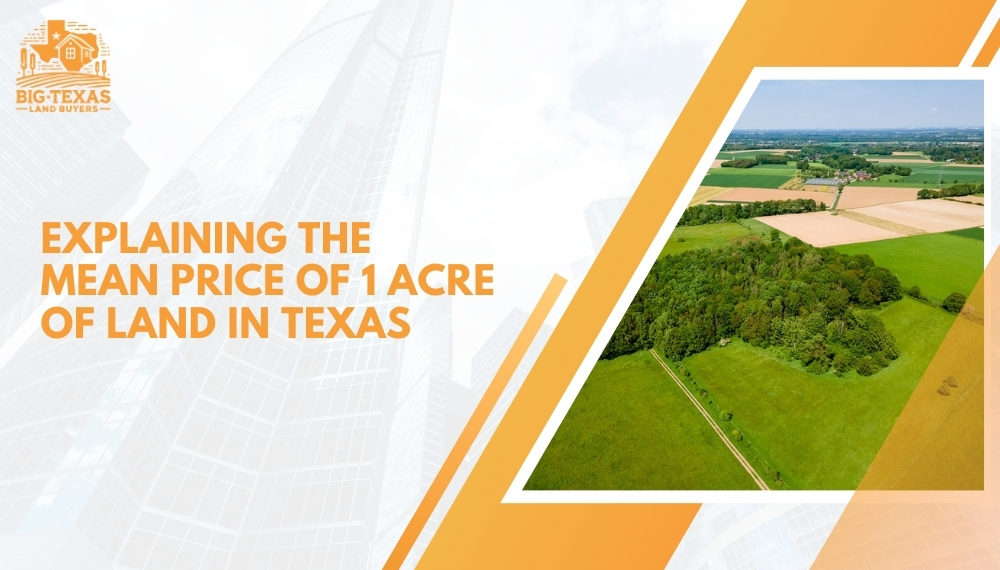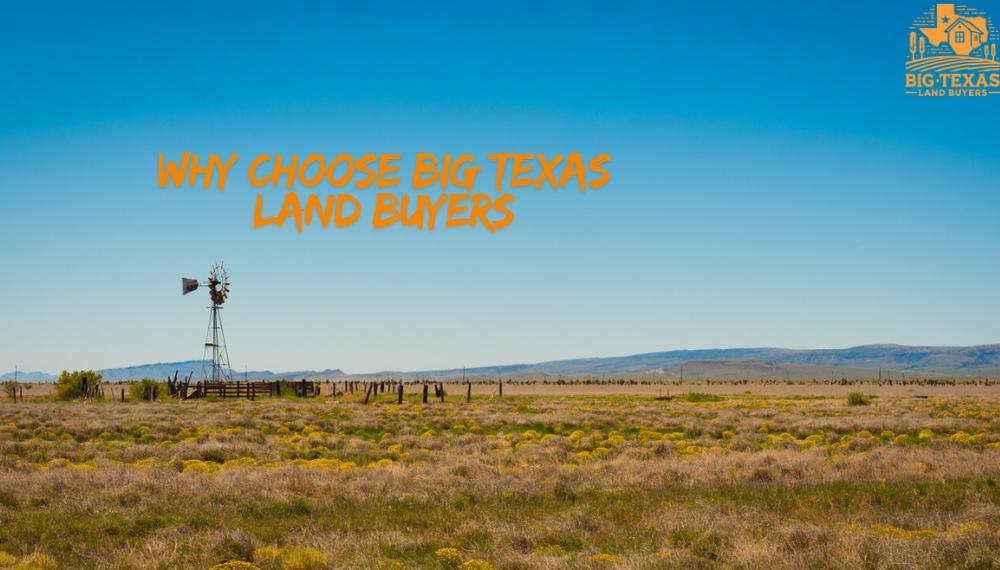The adventure of buying land in Texas is great, whether you’d want to construct your house or invest in real estate or begin a business. However, one must know the cost of the plot to invest in it.
This is the guide for anyone interested in finding out how much is 1 acre of land in Texas , what makes the prices this way, and a few tips for any homebuyer.
Explaining the Mean Price of 1 Acre of Land in Texas

Average prices for 1 acre of land vary significantly according to location, type of land, and market conditions as of late 2024 in Texas.
Statistics show that an average lot of 1 acre sells at approximately $4,670 per acre but can go as low as $1,228 per acre at times in the rural regions. Its highest points are when sold for more than $100,000 per acre in highly urbanized centers such as Houston and Austin.
Regional Price Differences
- Urban Areas: In the urban areas that include Houston, Dallas, and Austin, the price of the land is much higher. The demand will be high here, but the available area is very small. Here $100,000 per acre is considered normal.
- Suburban Areas: The areas surrounding large cities, especially the suburbs, are cheap, about $10,000 to $50,000 an acre.
- Rural Areas: Land goes for as low as $1,228 an acre if you venture into rural Texas. Areas noted with a low price on land are found in Panhandle and West Texas.
Factors Determining the Land Price
In Texas, the land prices are determined by the following factors:
- Location: The price of land is a bit high if it is close to mega cities or highways and other amenities. Again, land near a big city or in an urban area is sold at higher prices compared to those in rural areas because more people are willing to spend money in such areas.
- Land Use: The use of land-the residential, commercial, or agricultural purposes-determines the price of land. Commercial land tends to sell at prices that are a little higher than residential or agricultural purposes.
- Zoning Regulations: Zoning regulations are ascertained by the local government; these specify the usage of land. This can influence the value as the land that is farther away from commercial use may be highly priced compared to residential land.
- Market Demand: The general conditions of the land market pertaining to demand and supply causes price variation.
- Utilities and Infrastructure: Availability of utilities including water, electricity, and sewage can also add value to the land. In terms of infrastructure also, properties with present infrastructure are more in demand.
How to Determine the Land Value
Determine the value of land before purchasing it. The following methods can help you determine the value of an acre in Texas:
1. Comparative Market Analysis
A CMA is an analysis designed to compare your targeted land with similar recently sold pieces in the same area. The method above also gives a clue about the market value based on data of actual sales.
2. Professional Appraisal
Professional appraisal services can give you an unbiased estimation about your land. These also consider many factors such as, for instance, the location, size, and the potential uses.
3. Online Real Estate Platforms
Use online real estate platforms such as Zillow, Realtor.com, and LandWatch to find valuable current land prices in Texas. You can filter the search by location, size, and price range to find comparable properties.
How to Buy Land in Texas?
Acquiring land in Texas entails following some steps. Some of these steps are;
Step 1: Define Your Purpose
You will first need to identify why you’re buying it before you start looking for land. Maybe you want a home, an investment, or perhaps a business? This will dictate what you should look for in a location.
Step 2: Set a Budget
Set up a budget that covers more than just the cost of the property, such as closing fees and possible property taxes and development costs. This limits your options based on budget
Step 3: Locations
Consider several locations in the state of Texas and decide on an area to suit your requirements. Pay attention to the distance from work, schools, and other facilities. Study the local real estate market trend so you will understand much better about the market.
Step 4: Seek a Real Estate Agent
Working with a seasoned real estate agent who knows his way around land sales is highly beneficial as he can help choose the right properties, advise on the negotiating of a favorable price, and guide through all the steps of purchase.
Step 5: View the property
Always view the land before buying. Take an opportunity to evaluate the terrain, access to utilities, and the general surrounding area. Note any challenges that may have an effect on your plans.
Step 6: Make an Offer
Engage your real estate agent once you have identified the perfect property, and negotiate a competitive offer. Negotiation is expected since sellers are likely to push back on your initial offer.
Step 7: Due Diligence
Due diligence is the investigation undertaken before the final buying. One might concentrate upon the queries of zoning regulation, the restrictions generated upon the land usage, and on the environment.
Hence, it would be confirmed whether the land that has been chosen for is apt for the intended purpose, and there is no legal issue or otherwise.
Step 8: Finance
If you require money, think about your financing early on during the process. You can ask for conventional loans, owner financing, or programs by the government to help raise funds for purchasing your land.
Step 9: Closing
Once all of the contingencies in your offer are met, you can close. At this point, the deal gets sealed with paper and money; the land is yours.
Step 10: Development Plan
After purchasing the land, you can then really start thinking about what to do with it. Whether it is building a house, starting a company, or using it for agricultural use, planning always allows one to fully utilize his investment.
Financings Your Land Acquisition
Once you have decided to buy land in Texas, knowing how to finance that acquisition is a very important matter. Here are the most common methods:
1. Traditional Loans
Most all banks and credit unions provide loans for land acquisitions. Land loans normally require significantly more than a down payment when you are getting a traditional home mortgage. Typically, this is between 20% to 50% down.
2. Owner Financing
In some cases, the sellers can offer owner financing. This typically means you will pay off the seller rather than a bank. If you really cannot get traditional financing, then this could be a nice accommodating option.
3. Government Programs
There are various government programs designed for the first-time buyer of land, especially agricultural land. Look for local and federal programs with financial aid or easier loan programs.
Long-term Investment Potential
Land investment is one wise economic choice for any individual, most especially in Texas, as their values increase with time. Here are some relevant points associated with land and long-term investment:
1. Market Trends
Observe market trends and other economic views that may fluctuate land value. Locations with an increase in population and infrastructural growth often experience a surge in the cost of lands.
2. Diversification
In addition to stocks and bonds, land ownership diversifies your portfolio. Land acts as a stable investment during economic fluctuations as it is tangible.
3. Appreciation
Since Texas is witnessing growth in various sectors, the land here can be expected to appreciate significantly in the long run. This can lead you to significant returns when selling later on.
Big Texas Land Buyers: Your Trusted Partner
Big Texas Land Buyers is your partner when buying land in Texas. They specialize in offering quality services to the buyers who seek to acquire just the right land that suits their needs and budget.
The team members at Big Texas Land Buyers have deep insight into the real estate market in Texas, so they’re best placed to offer you essential and quality guidance when purchasing your desired land.
Why Choose Big Texas Land Buyers?

- Experience: Their team is familiar with the market of Texas land and can hence guide you with the most original information and advice.
- Wide Selection: They can offer you a range of properties from rural lands to suburban plots, and everything in between for different types of buyers.
- Customer-Friendly Approach: Big Texas Land Buyers focuses on customer satisfaction by keeping in close communication with their clients and understanding their needs as well as goals.
- Streamlined Process: They make the buying process easy for you to produce, assisting in everything from property search to closing procedures for making it easier to accomplish that dream of owning land.
For more information and assistance, visit Big Texas Land Buyers.
Conclusion:
Buying 1 acre of land can be the most rewarding investment in Texas. Certainly, there are costs involved alongside factors that influence prices, and the process of buying. Therefore, one will make the right decisions by conducting thorough research and working with professionals, while also planning for the future. Whether it is for building a home, investing, or starting a business, Texas offers diversified options for land buyers. Remember to stay informed about market trends and be prepared for the responsibilities that come with land ownership.

